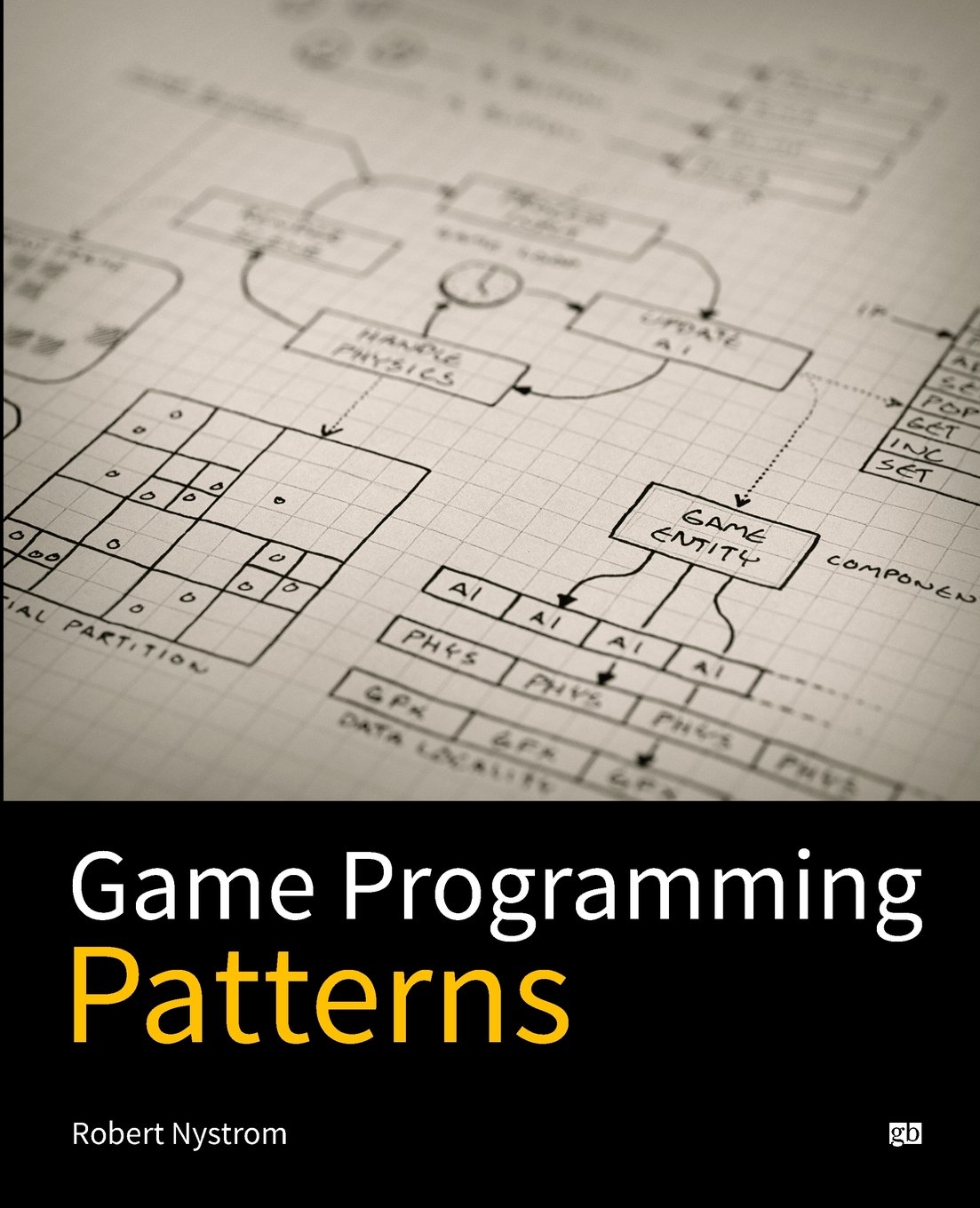Game Programming Patterns

Serialization
Object Serialization
Serialized descriptors
- XML, JSON, INI, CFG,...
- some languages (C++) don't provide a standardized serialization facility
- JSON is a good fit for JavaScript as it is it's natural object notation
Database
- Web environment: Web storage (small data), IndexedDB (large data)
- Desktop/mobile: SQLite, CastleDB,...
- Games that don't have a multiplayer facility rarely need more than a simple database for config and save data
Save data
- dump of all the parts of the game required to restore the full state
- size varies, for most of the games it's usually several MB
Example: Web storage
Local Storage
- for data of a smaller size (config, game state)
- up to 10MB, no expiration time
- keys and values are strings
let myStorage = window.localStorage;
myStorage.setItem('player_state', player.stateId);
myStorage.removeItem('player_state');
myStorage.clear();
IndexedDB
- JS-based object-oriented DB
- low-level API for structured data, including files/blobs
- a bit cumbersome, yet many wrappers have been developped, such as DEXIE
await db.players.add({
name: 'DoDo',
avatar: await getBlob('dodo.png'),
key_mapping: 'default'
});
Example: OpenTTD save format
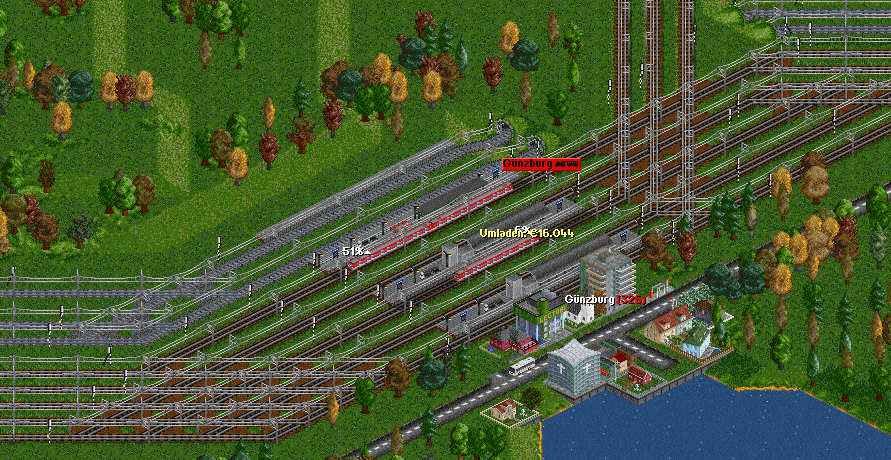
- 3 data layers
- very complex format
Example: Doom save format
- DSG files
- the game loads the level and restores the state by going through its aspects
- virtually nullifies the feasibility of the manual hacking except the player data
Aspects:
- doors, switches, elevators, stairs, lights
- items picked/available
- projectiles/teleport fog/respawn
- animation, damage
- linedefs seen on automap
- items/kills gained counter
// p_saveg.c::P_UnArchiveThinkers
while (1) {
tclass = *save_p++;
switch (tclass) {
case tc_mobj:
PADSAVEP();
mobj = Z_Malloc (sizeof(*mobj), PU_LEVEL, NULL);
memcpy (mobj, save_p, sizeof(*mobj));
save_p += sizeof(*mobj);
mobj->state = &states[(int)mobj->state];
mobj->target = NULL;
if (mobj->player) {
mobj->player = &players[(int)mobj->player-1];
mobj->player->mo = mobj;
}
P_SetThingPosition (mobj);
mobj->info = &mobjinfo[mobj->type];
P_AddThinker (&mobj->thinker);
Custom save data
Serialized object
- either dump binary data or text files (JSON, XML,...)
- circular dependencies and pointers need to be handled manually
Parsable format
- binary format or a text file
- text file is a good choice if the content isn't very large and security isn't concerned
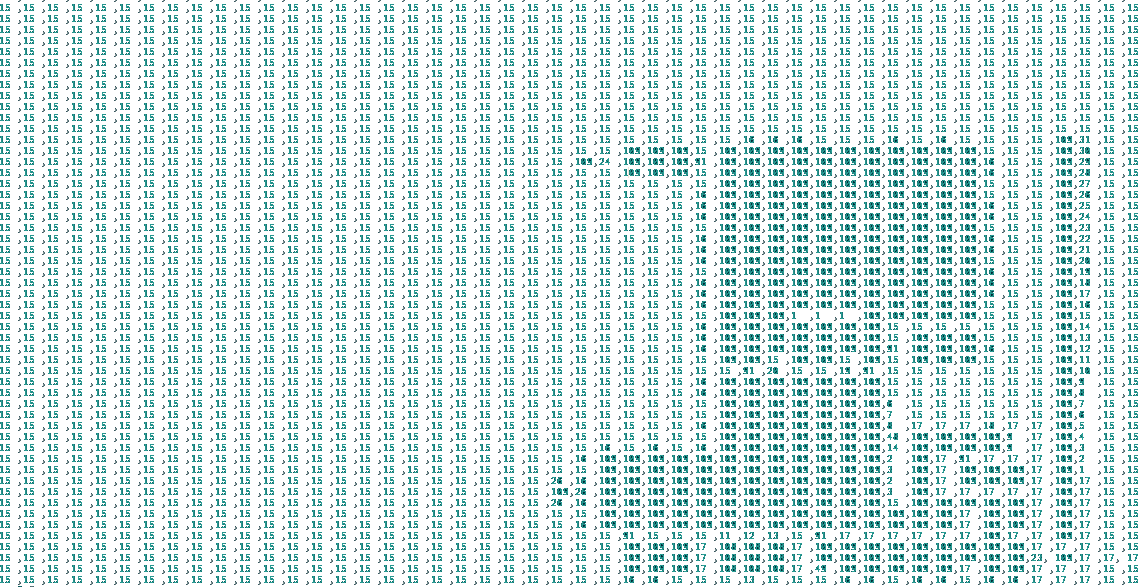
Grid-based map in .txt file
Performance
Performance issues
Memory caching issues
- CPU first tries to find data in the L1 cache
- then it tries the larger but higher-latency L2 cache
- then it tries L3 cache and DDR memory
Avoiding cache miss
- arrange your data in RAM in such a way that min cache misses occure
- organise data in contiguous blocks that are as small as possible
- avoid calling functions from within a performance-critical section of code
Avoiding branch missprediction
- branch = when you use an IF statement
- pipelined CPU tries to guess at which branch is going to be taken
- if the guess is wrong, pipeline must be flushed
// iterating inside out -> SLOW
for (i = 0 to size)
for (j = 0 to size)
do something with array[j][i]
// iterating outside in -> FAST
for (i = 0 to size)
for (j = 0 to size)
do something with array[i][j]
// assume only 50% active/visible objects
gameLoop(delta, absolute) {
for(var entity in this.entities) {
// 50% mispredictions
if(entity.ACTIVE) {
entity.update(delta, absolute);
}
if(entity.VISIBLE) {
entity.draw();
}
}
}
Memory gap
- we can process data faster than ever, yet we can't get that data faster
- RAM isn't so random access anymore
- it can take hundreds of cycles to fetch a byte of data from RAM
- algorithm full of cache misses can be up to 50x slower
Example: data stored randomly in memory
Example: data stored sequentially
Programming patterns
or... just a few ideas and suggestions
Two-stage initialization
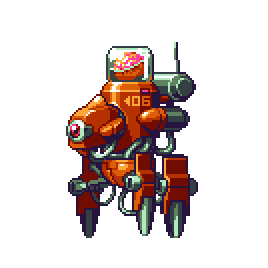
- Avoids passing everything through the constructor
- Constructor creates an object, init method initializes it
- Objects can be initialized several times
- Objects can be allocated in-advance in a pool
class Brainbot extends Unit {
private damage: number;
private currentWeapon: WeaponType;
constructor() {
super(UnitType.BRAIN_BOT);
}
init(attributes: UnitAttribs) {
// set default values
this.damage = DEFAULT_DAMAGE_BRAINBOT;
this.currentWeapon = WeaponType.LASERGUN;
this.attributes = attributes;
}
}
Separation of concerns
- a common misuse is to handle complex events in one place
- solution: send messages and let other parts of the game worry
- in one place
- separated
if(asteroid.position.distance(rocket.position) <= MIN_PROXIMITY) { // detect proximity
rocket.runAnimation(ANIM_EXPLOSION); // react instantly and handle everything
asteroid.runAnimation(ANIM_EXPLOSION);
playSound(SOUND_EXPLOSION);
asteroid.delete();
rocket.delete();
}
let collisions = this.collisionSystem.checkProximity(allGameObjects);
collisions.forEach(colliding => this.sendEvent(COLLISION_TRIGGERED, colliding));
// rocket-handler.ts
onCollisionTriggered(colliding) {
this.destroy();
this.sendEvent(ROCKET_DESTROYED);
}
// sound-component.ts
onGameObjectDestroyed() {
this.playSound(SOUND_EXPLOSION);
}
ID generator
- a simple way how to generate consecutive integers
- Java (thread-safe)
public class Generator {
private final static AtomicInteger counter = new AtomicInteger();
public static int getId() {
return counter.incrementAndGet();
}
}
- TypeScript, using a generator
function* generateId() {
let id = 0;
while(true) {
yield id;
id++;
}
}
let newId = generateId().next();
- TypeScript, using a static variable
class Generator {
static idCounter = 0;
getId(): number {
return Generator.idCounter++;
}
}
State
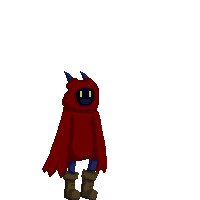
- several meanings (state of the whole game, internal state of entities,...)
- in this context, it is just a member of a set, determining what actions an object may execute
// stateless, the creature will jump each frame
creatureUpdate(delta: number, absolute: number) {
if(pressedKeys.has(KeyCode.UP)) {
this.creature.jump();
}
}
// a variable that makes certain actions possible only according to the current state
creatureUpdate(delta: number, absolute: number) {
if(pressedKeys.has(KeyCode.UP) && this.creature.state !== STATE_JUMPING) {
this.creature.changeState(STATE_JUMPING);
this.creature.jump();
}
}
Flags

- bit array that stores binary properties of game objects
- may be used for queries (e.g. find all DEAD objects)
- similar to a state machine but behaves differently
- if we maintain all flags within one single structure, we can search very fast
Example: Flag Table

Dirty Flag
- marks changed objects
- can be applied to various attributes (animation, physics, transformation)
- you have to make sure to set the flag every time the state changes
- you have to keep the previous derived data in memory
Cleaning
- When the result is needed
- Avoids doing recalculation if the result is never used
- Game can freeze for expensive calculations
- At well-defined checkpoints
- less impact on user experience
- you never know, when it happens
- On the background
- You can do more redundant work
- race-condition may occur
Example: Atomic Game Engine markdirty
void Node::MarkDirty() {
// a) whenever a node is marked dirty, all its children are marked dirty as well.
// b) whenever a node is cleared from being dirty, all its parents must have been
// cleared as well.
if (this->dirty_) return;
this->dirty_ = true;
// Notify listener components first, then mark child nodes
for (auto i = this->listeners_.Begin(); i != this->listeners_.End();) {
Component *c = *i;
if (c) {
c->OnMarkedDirty(this);
++i;
} else {
*i = this->listeners_.Back(); // listener expired -> erase from list
this->listeners_.Pop();
}
}
// Mark all children dirty
for(auto child : children) {
child->MarkDirty();
}
}
Example: PIXI Container sort
addChild(child) {
// if the child has a parent then lets remove it as PixiJS objects can only exist in one place
if (child.parent) {
child.parent.removeChild(child);
}
child.parent = this;
this.sortDirty = true;
...
this.emit('childAdded', child, this, this.children.length - 1);
child.emit('added', this);
return child;
}
updateTransform() {
if (this.sortableChildren && this.sortDirty) {
this.sortChildren();
}
...
}
String hash
- in C++, strings are expensive to work at runtime, strcmp has O(n) complexity
- luckily, many scripting engines use string interning
- game engines widely use string hash which maps a string onto a semi-unique integer
- algorithms: djb2, sdbm, lose lose,...
- example: sdbm
// hashing function
inline unsigned SDBMHash(unsigned hash, unsigned char c)
{ return c + (hash << 6) + (hash << 16) - hash; }
unsigned calc(const char* str, unsigned hash = 0) {
while (*str) {
// Perform the current hashing as case-insensitive
char c = *str;
hash = SDBMHash(hash, (unsigned char)tolower(c));
++str;
}
return hash;
}
Builder
- slightly different from the builder defined by GoF
- stores attributes needed to build a game object, can be used to build several objects
- Aspect in Artemis framework, Prefab in Unity
class Builder {
private _position: Vector;
private _scale: Vector;
position(pos: Vector) {
this.position = pos;
return this;
}
scale(scale: Vector) {
this.scale = scale;
return this;
}
build() {
return new GameObject(this._position, this._scale);
}
}
new Builder().position(new Vector(12, 54)).scale(new Vector(2, 1)).build();
Factory
- Builder assembles an object, factory manages the assembling
- Factory creates an object according to the parameters but with respect to the context
class UnitFactory {
private pikemanBuilder: Builder; // preconfigured to build pikemans
private musketeerBuilder: Builder; // preconfigured to build musketeers
private archerBuilder: Builder; // preconfigured to build archers
public spawnPikeman(position: Vector, faction: FactionType): GameObject {
return this.pikeman.position(position).faction(faction).build();
}
public spawnMusketeer(position: Vector, faction: FactionType): GameObject {
return this.musketeerBuilder.position(position).faction(faction).build();
}
public spawnArcher(position: Vector, faction: FactionType): GameObject {
return this.archerBuilder.position(position).faction(faction).build();
}
}
Value provider
- instead of passing a value, we pass a function pointer that returns this value
- may generate new values upon every call or just return a value according to the context
class UnitFactory {
private pikemanBuilder: Builder;
private musketeerBuilder: Builder;
private archerBuilder: Builder;
public initBuilders() {
// sprites are shared, weapons must be instantiated for each instance
this.pikemanBuilder.sprite(Sprites.PIKEMAN).weapon(() => new Spear());
this.musketeerBuilder.sprite(Sprites.Musketeer).weapon(() => new Musket());
this.archerBuilder.sprite(Sprites.ARCHER).weapon(() => new Bow());
}
...
}
Flyweight
- an object holds shared data to support large number of fine-grained objects
- example: instanced rendering, geometry hashing, particle systems
Replay


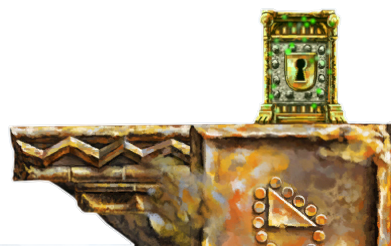
- allows to reproduce any state of a game at any time
- much more complex than the save mechanism
- all game entities must have a reproducible behavior (similar to multiplayer facility)
- two main impediments: random functions and nondeterministic operations
- Solution a)
- store the state of all objects in the game - either on frame basis or at a fixed frequency
- reproduce them by modifying all objects at each frame
- Solution b)
- if the game is completely message-driven, we can store all game messages
- during the replay, forbid all components to send messages on their own
- send queued messages one by one and let them be processed
Example: Doom DEMO file
- Lump file (*.LMP)
- Doom (1993) used fixed time-loop at a rate of 35 FPS (tic command)
- the file contains ONLY keyboard inputs at each tick
- the game plays the demo, bypassing input commands from the demo file
- 13B header + 4B data for each tick ~ 140B/s
Case study: Tower defense
Tower defense
Goal
- to defend a portal, obstructing the attackers by placing defensive structures along their path
- the base must survive waves of multiple enemies
Common features
- ability to build, repair and upgrade towers
- enemies capable of traversing multiple paths
- enemies capable of destroying towers
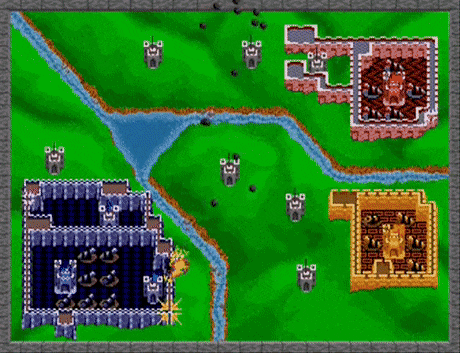
Rampart (1990)
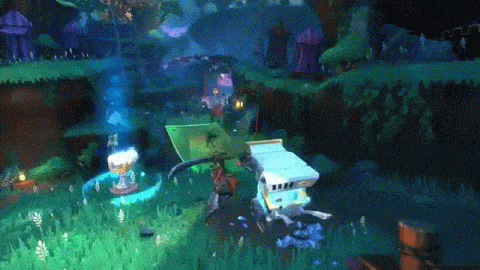
Dungeon Defenders 2 (2017)
Tower defense games
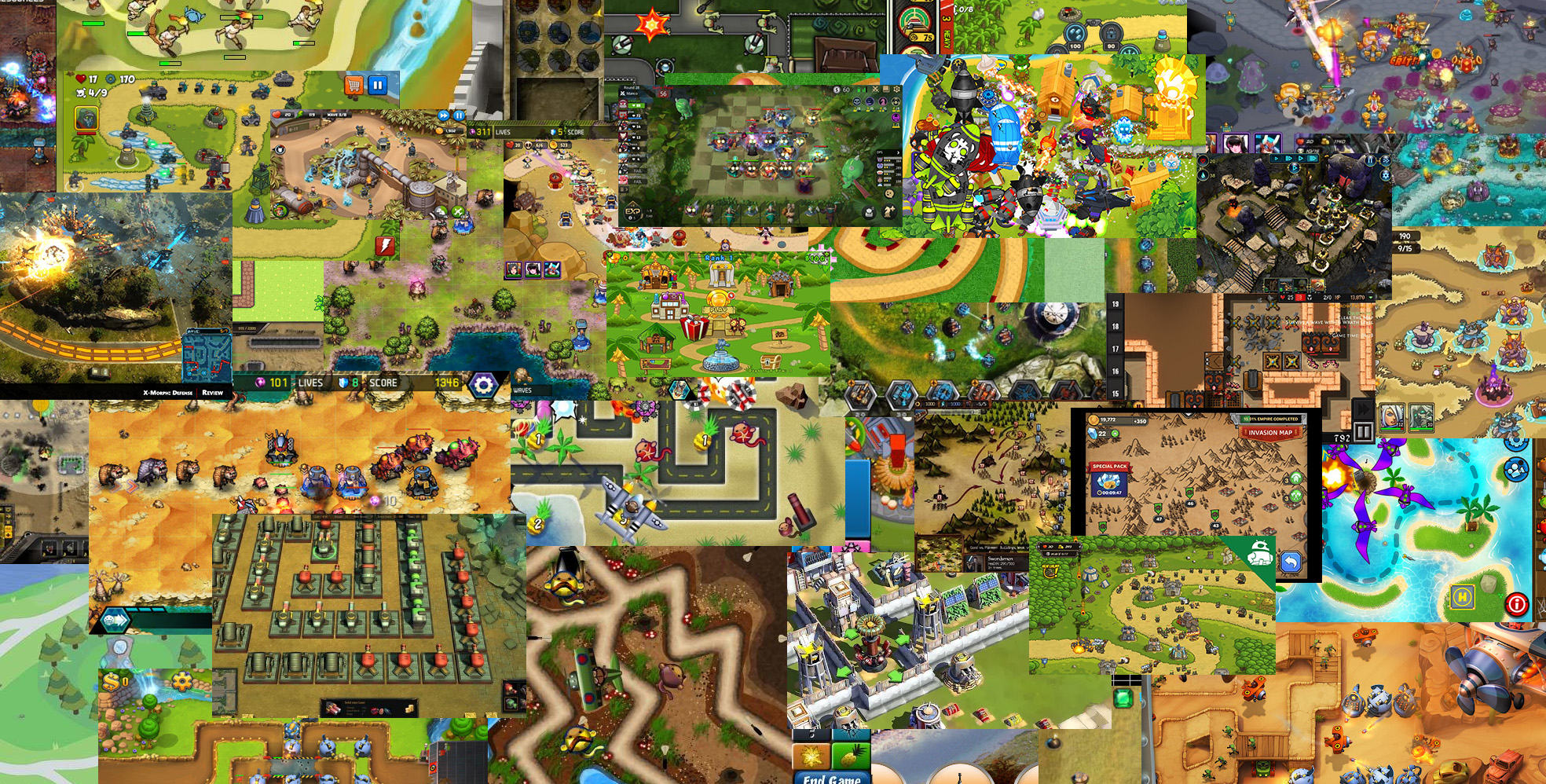
Proposed features
- Grid map
- Indestructible towers
- No obstructions on the path
- No flying enemies
- Active towers - fire projectiles
- Passive towers - radiate energy
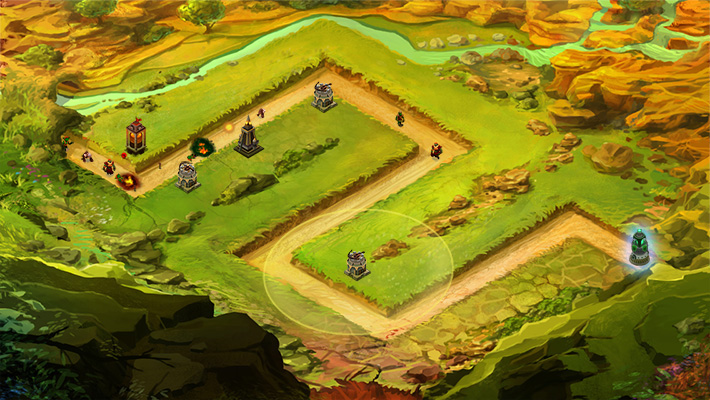
Map model
Data model
Entities
- Level - aggregates all objects of the current level
- Map - grid map
- Tile - a map cell of a given type
- Player - player that controls all towers
- Wave - a single wave
- Creep - spawned creep
- CreepPrototype - keeps default attributes of each creep
- Tower - tower placed on a map
- TowerPrototype - keeps default attributes of each tower
- Portal - end of the road that needs to be defended
- Projectile - a tower projectile
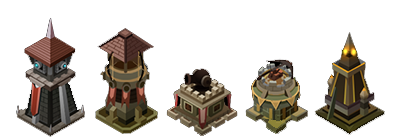
Arcane Archer Cannon Crossbow Dark

Gremlin Goblin Imp Giant
Game attributes
Game components
Tower states
Game events
Lecture 5 Review
- two-stage initialization - avoids passing everything through the constructor
- state - a variable determining what actions an object may execute
- flags - a bit array that stores binary properties of game objects
- dirty flag - marks changed objectgs
- builder - stores attributes needed to create a game object
- factory - manages the way new objects are created
- flyweight - holds shared data to support large number of objects
- replay - allows to reproduce any state of the game at any time
Goodbye quote
I'm blind, not deafIllidan Stormrage, Warcraft
